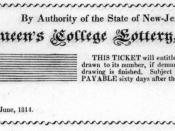The various changes of environment always affect peopleÃÂs life. Human being tended to select the best life styles to fit the nature, and to better adapted to the world. DarwinÃÂs idea of adaptive changes applied to the short story ÃÂThe LotteryÃÂ by Shirley Jackson. In the story, the small town kept holding the lottery, while other towns refused to continue the lottery. The townsÃÂ refusal illustrated that the villagers in those towns adapted well to the environment. The more changes the villagers made, the more comfortable their life would be, because they were moving to a way of better life. There were several reasons that the villagers wanted to quit the lottery in order to be comfortable in the environment.
As the time passed over, the population of all the towns increased a lot. The villagesÃÂ population was ÃÂlikely to keep on growingÃÂ in the future, since more and more people were moving toward the villages (197).
The adaptive changes applied to the event that the villagers gave up the lottery. They might think that it was too difficult to hold the lottery with so many people. There must be problems on how to regulate the activity effectively. The crowded people might cause chaos. Jackson stated that ÃÂin some towns there were so many people that the lottery took two days and had to be started on June 2ndÃÂ, to illustrate the difficulty of holding the lottery. We could assume those towns, which had quit the lottery, had much more population than that.
There were also new industries and businesses formed in the towns, as a result, people might have no time and energy to ÃÂdevote to civic activitiesÃÂ (197). In the small town, there were only three people who held big businesses: Mr. Summers, Mr. Graves...



The Lottery
I find it difficult to respond to this essay because I feel that the writer has managed to misread Shirley Jackson's story "The Lottery." Does the author of this essay really believe that Ms. Jackson is describing actual events, that at one time or another towns in America held lotteries in which a resident was chosen for human sacrifice? That is certainly what the writer implies.
While Ms. Jackson gives only a day and no direct indication of a year, there are many indications that the story in set in modern times, not in some ancient time as the writer tires to suggest: men talk of "tractors and taxes." The tractor was first developed in the nineteenth century, and not mass produced or in common use until the twentieth. A school year ending in June rather than some months earlier similarly suggests a recent setting, as do the references to a grocery, as opposed to a general store or a trading post. The dialogue among the characters is filled with modern colloquialisms and has none of the affectations or formalism of colonial or Puritan speech.
And what is the purpose of this lottery? A single item suggests the reason for this ritual carried out each June 27:
Old Man Warner snorted. "Pack of crazy fools," he said. "Listening to the young folks, nothing's good enough for them. Next thing you know, they'll be wanting to go back to living in caves, nobody work any more, live that way for a while. Used to be a saying about 'Lottery in June, corn be heavy soon.' First thing you know, we'd all be eating stewed chickweed and acorns. There's always been a lottery," he added petulantly.
While the saying may have been dropped, the belief among these townsfolk appears unquestioned: a propitiatory human sacrifice is demanded each year to ensure continued natural bounty. Ms. Jackson does not hint at why the villagers believe that this human sacrifice is necessary, but the discussion of the tradition surrounding the lottery indicates that it is of an ancient origin. But does the author seriously suggest that in towns and villages in twentieth century America or even nineteenth century America people would engage in or would be allowed to engage in annual human sacrifice without someone raising an outcry against this practice?
But there is no outcry here. Mrs. Hutchinson, soon to be the victim, arrives in a perfectly social mood, and laughs softly with her friends about almost being late. To the end, she does not object to the lottery as such -- she wants it done over – she merely objects to be the victim.
The writer also suggests that these people are bound to the lottery out of fear of being its next victim, but there is no suggestion that the lottery was conducted in anything less than a purely fair manner. The victim was chosen at random rather than in response to any attitudes.
The essay writer finally acknowledges that stoning a person to death is "immoral." Yes. It is murder. And the fact that it is presented in this story as a practice carried on since time immemorial does not make it less murder.
Contrary to the writer's suggestion, Darwinian evolution and industrialization never caused Americans to move away from annual ritualistic human sacrifice, because the lottery is an allegorical fantasy, not an accurate report of an actual event. "The Lottery" is a comment about human nature. Is there enough evil in any human being, in all human beings, that if we were presented with some shockingly evil custom, we would join in perpetuating it? When Shirley Jackson wrote "The Lottery" in 1948, racism was widespread in America. People were being hounded out of jobs and careers over political beliefs. The German people had participated in the Holocaust in which six million people were slaughtered.
I have a hard time commenting on this essay. I think the writer completely missed the point.
2 out of 2 people found this comment useful.